人教版英语八年级下第一单元
人教版八年级英语下册 Unit 1 What’s the matter?知识点复习

人教版英语八年级下册第一单元知识点过关Unit 1 What’s the matter?一、重点短语1. have a fever 发烧,具体运用:She has a fever and she should lie down and rest.2. have a cough 咳嗽,cough既可以作名词,也可以作动词3. have a toothache 牙疼;tooth牙齿+ ache疼痛toothache 牙痛4. talk too much 说得太多;类似短语:eat too much吃太多5. drink enough water 喝足够的水;take enough money带够钱6. have a cold 受凉、感冒;也可以用catch a cold7. have a stomachache 胃疼;stomach胃+ache疼痛stomachache 胃疼8. have a sore back 背疼;sore疼痛+back背sore back背疼9. have a sore throat 喉咙痛10. lie down and rest 躺下休息11. hot tea with honey 加蜂蜜的热茶;with表示“带有”12. see a dentist 看牙医;看医生用“see”13. get an X-ray 拍X 光片14. take one’ s temperature 量体温;量体温、服药都用“take”15. put some medicine on sth. 在……上面敷药;例如:put some medicine on the cut在切口处敷药16. feel very hot 感到很热;feel感官动词,后接形容词17. sound like 听起来像;例如:sounds like a good idea 听起来像个好主意18. all weekend 整个周末;类似短语:all day \ all night \ all month19. in the same way 以同样的方式20. go to a doctor 看医生21. go along 沿着……走;类似短语:walk along22. on the side of the road 在马路边23. shout for help 大声呼救24. without thinking twice 没有多想;without是介词,后接动词ing形式25. get off 下车;反义词get on上车26. have a heart problem 患有心脏病27. to one’ s surprise 使....... 惊讶的;例如:to my surprise \ to his surprise28. thanks to 多亏了、由于;例如:Thanks to the the doctors , the patient was saved in time. 多亏了医生们,这个病人及时被救了。
最全面人教版八年级下册英语第一单元知识点归纳总结

Unit 1 What's the matter?一、词汇与短语◆重点单词A部分1.matter n. 问题;事情2.sore adj. 疼痛的;酸痛的3.stomachache n. 胃痛;腹痛4.foot n. 脚;足5.neck n. 颈;脖子6.stomach n. 胃;腹部7.throat n. 咽喉;喉咙8.hurt v. (使)疼痛;受伤9.fever n. 发烧10.passenger n. 乘客;旅客11.lie v. 躺;平躺12.break n. 间歇;休息13.rest v. &n. 放松;休息14.onto prep. 向;朝15.X-ray n. X射线;X光16.trouble n. 问题;苦恼17.toothache n. 牙痛18.hit n. (用手或器具)击;打19.headache n. 头痛20.herself pron. (she的反身代词)她自己21.off adv. & prep. 离开(某处);不工作;从……去掉B部分1.bandage n. 绷带v. 用绷带包扎2.press v. 压;挤;按3.sick adj. 生病的;有病的4.knee n. 膝;膝盖5.breathe v. 呼吸6.knife n. 刀7.sunburned adj. 晒伤的8.blood n. 血9.ourselves pron. (we反身代词)我们自己10.mean v. 意思是;打算11.climber n. 登山者;攀登者12.importance n. 重要性;重要13.risk n.&v. 危险;风险;冒险14.decision n. 决定;抉择15.accident n.(交通)事故;意外遭遇16.control v.&n. 限制;约束;管理17.situation n. 情况;状况18.spirit n. 勇气;意志19.kilo( = kilogram) n. 千克;公斤20.death n. 死;死亡21.rock n. 岩石22.nurse n. 护士◆重点短语A部分1.have a cold 感冒2.lie down 躺下3.have a stomachache 胃痛4.take one's temperature 量体温5.have a fever 发烧6.to one's surprise 使……惊讶的是7.get off 下车8.right away 立即;马上9.take breaks (take a break) 休息10.talk too much 说得太多11.drink enough water 喝足够的水12.have a very sore throat 嗓子非常疼13.get an X-ray 拍X光片14.see a dentist 看牙医15.drink some hot tea with honey 喝一些加蜂蜜的热茶16.put some medicine on sth.在……上面敷一些药17.feel very hot 感到很热18.sound like 听起来像19.all weekend 整个周末20.in the same way 以同样的方式21.go to a doctor 看医生22.go along 沿着……走23.on the side of the road 在马路边24.shout for help 大声呼救25.without thinking twice 没有多想26.have a heart problem 有心脏病27.thanks to 多亏了;由于28.in time 及时29.save a life 挽救生命30.get into trouble 陷入麻烦31.hurt oneself 受伤32.fall down落下;摔倒B部分1.be used to 习惯于……;适应于……2.in a difficult situation 在困境中3.take risks (take a risk) 冒险4.keep on doing sth. 继续(或坚持)做某事5.run out (of) 用尽;耗尽6.make a decision 作出决定7.cut off 切除8.get hit on the head 撞到头部9.get out of 离开;从……岀来10.be interested in 对……感兴趣11.give up 放弃12.mean doing sth. 意味着做某事13.put a bandage on sth. 用绷带包扎…14.lose one's life 失去生命15.feel sick 感到恶心16.mountain climbing 登山运动17.have problems breathing 呼吸困难18.be in control of 掌管;管理◆重点句子A部分1.What's the matter with you?=What's the trouble with you?=What's wrong with you?你怎么了?2.What should she do? 她该怎么办呢?3.Did you fall down? 你跌倒了吗?4.Should I take my temperature? 我应该量一下体温吗?5.I think I sat in the same way for too long without moving.我想我以同样的姿势一动不动地坐得太久了。
新人教版八年级英语下册Unit 1全单元课件(115张ppt)

1c Look at the picture. What are the students’ problems? Make conversations.
What’s the matter with Judy?
She talked too much yesterday and didn’t drink enough water. She has a very sore throat now.
Can you name the parts of the body?
matter n. 问题;事情 sore adj. 疼痛的;酸痛的 have a cole a stomachache 胃痛 foot n. 脚;足 neck n. 脖子 throat n. 咽喉;喉咙
1a Look at the picture. Write the correct letter [a-m ] for each part of the body.
__ h arm __ a hand ___ d neck
g ear ___ e back ___ j head ___ ___ l leg ___nose ___ m k stomach
What’s the matter with Sarah?
She didn’t take care of herself on the weekend. She was playing with her friends at the park yesterday. Then it got windy, but she didn’t put on her jacket. Now she has a cold.
Conversation 4 Nurse: What’s the matter, Nancy? Girl: I _______________. have a toothache Conversation 5 Betty: What’s the matter, Judy? Ann: She ________________. has a sore throat
最新人教版八年级英语下册第一单元知识点汇总

最新人教版八年级英语下册第一单元知识点汇总Unit 1 What’s the matter?一、基础知识1.我感冒了。
可以表达为I had a cold、catch a cold或have the flu。
have a fever表示发烧,have a cough表示咳嗽,have a stomachache或肚子疼表示胃疼,have a toothache表示牙疼,have a headache表示头疼。
2.将身体部位和ache(疼痛)结合起来构成新的复合词,如stomach+ache=stomachache,head+ache=headache,tooth+ache=toothache,back+ache=backache,表示相应的疼痛。
3.“怎么啦?出什么事情了?”可以表达为What’ s the matter。
也可以用What’ s the trouble with you?或What’ s wrong with you。
matter和trouble为名词,其前可加the或形容词性物主代词,而wrong是形容词不能加the。
用于询问某人有什么病或遇到什么麻烦、问题,其后跟询问对象时,与介词with连用,如What’s the matter with sb。
= What’s your trouble?= What’s up?= What happens to sb。
举例来说,当问到“What’s the matter with you?”时,回答可以是“I have a bad cold.”4.maybe表示“或许”,常用于句首,表示可能性,后加句子。
例如Maybe you are right。
may be是情态动词+be的结构,意为“可能,也许”,后加名词、代词或形容词。
例如He maybe angry。
sound like可以和名词、代词以及从句结合使用,如It sounds like you don’t know the truth.It sounds like a good idea。
新人教版八年级英语下册第一单元知识点
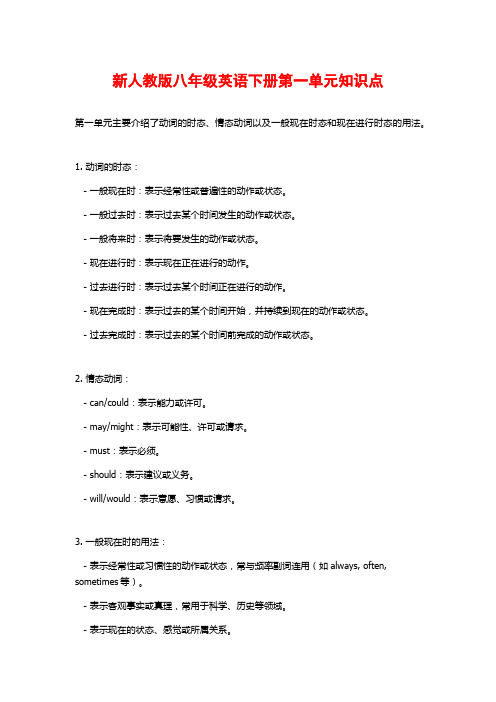
新人教版八年级英语下册第一单元知识点
第一单元主要介绍了动词的时态、情态动词以及一般现在时态和现在进行时态的用法。
1. 动词的时态:
- 一般现在时:表示经常性或普遍性的动作或状态。
- 一般过去时:表示过去某个时间发生的动作或状态。
- 一般将来时:表示将要发生的动作或状态。
- 现在进行时:表示现在正在进行的动作。
- 过去进行时:表示过去某个时间正在进行的动作。
- 现在完成时:表示过去的某个时间开始,并持续到现在的动作或状态。
- 过去完成时:表示过去的某个时间前完成的动作或状态。
2. 情态动词:
- can/could:表示能力或许可。
- may/might:表示可能性、许可或请求。
- must:表示必须。
- should:表示建议或义务。
- will/would:表示意愿、习惯或请求。
3. 一般现在时的用法:
- 表示经常性或习惯性的动作或状态,常与频率副词连用(如always, often, sometimes等)。
- 表示客观事实或真理,常用于科学、历史等领域。
- 表示现在的状态、感觉或所属关系。
4. 现在进行时的用法:
- 表示现阶段正在进行的动作或临时状态。
- 表示计划或安排的未来动作。
- 与always或often连用,表示经常性的不满或抱怨。
以上是第一单元的知识点,希望对你有帮助。
最新人教版八年级下册英语第一单元知识点
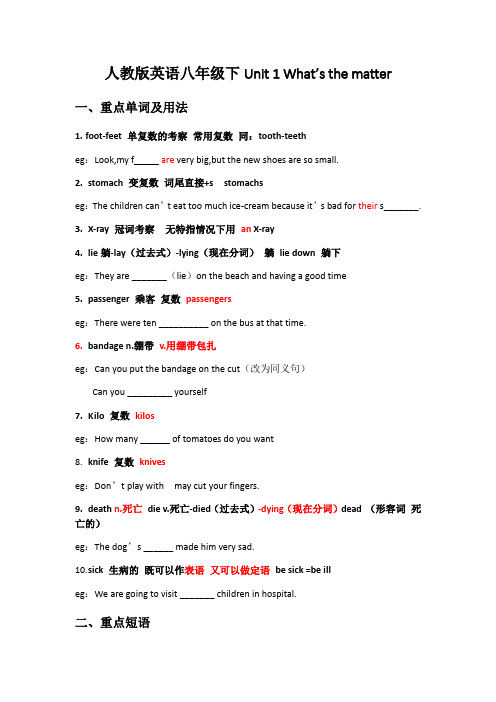
人教版英语八年级下Unit 1 What’s the matter一、重点单词及用法1.foot-feet 单复数的考察常用复数同:tooth-teetheg:Look,my f_____ are very big,but the new shoes are so small.2.stomach 变复数词尾直接+s stomachseg:The children can’t eat too much ice-cream because it’s bad for their s_______.3.X-ray 冠词考察无特指情况下用an X-ray4.lie躺-lay(过去式)-lying(现在分词)躺lie down 躺下eg:They are _______(lie)on the beach and having a good time5.passenger 乘客复数passengerseg:There were ten __________ on the bus at that time.6.bandage n.绷带v.用绷带包扎eg:Can you put the bandage on the cut(改为同义句)Can you _________ yourself7.Kilo 复数kiloseg:How many ______ of tomatoes do you want8.knife 复数kniveseg:Don’t play with may cut your fingers.9.death n.死亡die v.死亡-died(过去式)-dying(现在分词)dead (形容词死亡的)eg:The dog’s ______ made him very sad.10.s ick 生病的既可以作表语又可以做定语be sick =be illeg:We are going to visit _______ children in hospital.二、重点短语have a cold =catch a cold =have the flu 感冒cough 咳嗽lie down 躺下take one’s temperature 量体温have a fever 发烧take/have breaks/a break 休息=take/have a rest get off 下车-get on上车to one’s surprise 令某人惊讶的是right away 立刻马上=right now get into (trouble)陷入(麻烦)get sunburned 被晒伤be used to (doing)习惯于适应于...... take risks/a risk 去冒险run out (of)用完用尽cut off 切除get out of 离开从......出来be in control of 掌管管理give up (doing)放弃(做)某事have a stomachache 胃痛get an X-ray 做一个X射线检查thanks to......由于多亏in time 及时on time 准时think about 考虑think of认为fall down 摔倒make a decision 作决定put......on......把....放在...上be interested in 对...感兴趣三、用法总结1.need to do sth需要做某事eg: The teacher needs_____(rest) for a few minutes.like 意为“听起来像”后接n./adj./句子eg: It sounds like a good idea.类似的感官动词+like:feel like/smell like/ look like/taste like/seem likesound+adj. 结构中,sound 是系动词意为“听起来是”后接形容词eg:That sounds great.+n./doing(v.现在分词)He went to school without having breakfast. eg:He left the classroom without ________ anythingv.同意,赞成agree with sb/某人的意见看法Does she agree with usagree to do sth 同意做某事They agreed to solve the problem. problems (in) doing sth做某事有困难=have trouble/difficulty (in) doinghave problems with sth =have trouble/difficulty with sth 在某方面有困难eg:One of my good friends said he had problems__________(learn) English.get used to doing sth 习惯于做某事eg:He used to get up late,but now he is used to getting up early.used to do sth 过去常常做某事(现在不做了)eg:He used to read English in the evening.use sth to do sth 使用用某物做某事eg:So he used knife to cut off his arm.be used to do sth 被动被用于做某事eg:These new pens are used to paint the wall.one’s life 丧失生命save one’s life 挽救某人的生命eg:He lost his life in the car accident.adj.足够的充足的后接名词n. enough moneyadv.足够地修饰形容词/副词enough要后置eg:The book is_______,but I don’t have enough money ______it.interesting; to buy enough; to buyenough; buying interesting; buying9. the importance of (doing)sth (做)某事的重要性important adj.重要的unimportant adj.不重要的importance n.重要性eg:We students should know the importance of (learning)English.n.决定make a decision (to do sth)decide to do sth 决定做某事decide not to do sth 决定不做某事eg:Tom made a decision to study English well.up 放弃give up 是动词+副词结构接代词作宾语时代词放中间eg:The problem is so difficult for you,but don’t _______A.give it up it out up it out itgive up doing sth 放弃做某事eg:You will be very sad if you give up______(sing).用法keep on doing sth 继续做某事(中间有间隔强调重复性)eg:He kept on studying though he was very tired.keep doing sth 继续不停地做某事(不间断连续性)eg:Keep walking until you reach the end of the road.keep sb doing 让某人一直做某事eg:Don’t keep the other students waiting.keep sb from doing sth 阻止某人做某事eg:We should keep the little boy from stepping on the grass.用法find找到,强调寻找的结果look for强调寻找过程find out找出查明eg:I was looking for my watch,but I didn’t find it.find sb doing sth 发现某人正在做某事eg:When I walked along the road,I found an old man shouting for help.find it +adj形容词+to do sth 发现做某事是...的eg:She found it hard to finish the work by herself.risks=take a risk 冒险He likes taking risks.risk one’s life to do 冒着生命危险去做某事eg:He risked his life to save the child.risk doing stheg: The man called Tom often risks flying over the sea.四、短语辨析1.see sb doing sth 看见某人正在做某事(动作正在发生)see sb do sth 看见某人做某事(看到动作全过程或者经常看到动作发生)eg:I saw the boy crying when I passed by(路过).类似的hear/watch/notice/find+sb do/doing sththanks to 多亏... 由于....=with the help of/with one’s help=because ofthanks for 因.......而感谢强调感谢的原因eg:Thanks to my teacher ,I passed the exam.Thanks for your help .Thanks for inviting me.2.in time 及时表示动作在规定时间内或比规定时间提前发生on time 准时按时指正好在规定时间内eg:Thanks for coming here to help me in time.The train arrived into the station on time.火车准时进站了。
人教版(新目标)初中英语八年级下册Unit 1
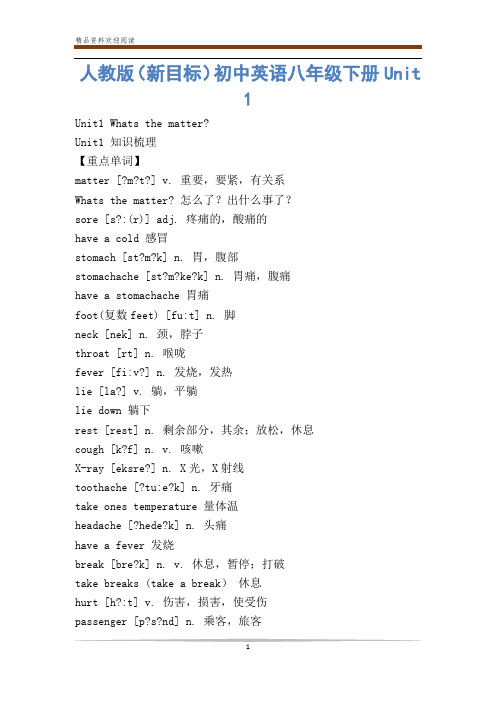
人教版(新目标)初中英语八年级下册Unit1Unit1 Whats the matter?Unit1 知识梳理【重点单词】matter [?m?t?] v. 重要,要紧,有关系Whats the matter? 怎么了?出什么事了?sore [s?:(r)] adj. 疼痛的,酸痛的have a cold 感冒stomach [st?m?k] n. 胃,腹部stomachache [st?m?ke?k] n. 胃痛,腹痛have a stomachache 胃痛foot(复数feet) [fu:t] n. 脚neck [nek] n. 颈,脖子throat [rt] n. 喉咙fever [fi:v?] n. 发烧,发热lie [la?] v. 躺,平躺lie down 躺下rest [rest] n. 剩余部分,其余;放松,休息cough [k?f] n. v. 咳嗽X-ray [eksre?] n. X光,X射线toothache [?tu:e?k] n. 牙痛take ones temperature 量体温headache [?hede?k] n. 头痛have a fever 发烧break [bre?k] n. v. 休息,暂停;打破take breaks (take a break)休息hurt [h?:t] v. 伤害,损害,使受伤passenger [p?s?nd] n. 乘客,旅客off [?f] adv. prep. 离开(某处);从去掉get off 下车to ones surprise 使惊讶,出乎意料onto [nt?] prep. 向,朝trouble [?tr?bl] n. 麻烦,烦扰,问题hit [hit] n. v. 碰撞,打,打击right away 立即,马上get into 陷入,参与herself [h?:?self] pron. 她自己,她本身(she的反身代词)bandage [b?nd?d?] n. v. 绷带;用绷带包扎sick [s?k] adj. 患病的,不适的knee [ni:] n. 膝盖nosebleed [?nzbli:d] n. 鼻出血breathe [bri:e] v. 呼吸sunburned [?s?nb?:nd] adj. 晒伤的ourselves [ɑ:?selvz] pron. 我们自己(we的反身代词)climber [?kla?m?(r)] n. 登山者be used to 习惯于适应于risk [r?sk] n. v. 风险,危险;冒险take risks (take a risk) 冒险accident [ksid?nt] n. 意外事件;事故situation [?sitju?ein] n. 状况,形式,情况kg=kilogram [?k?l?gr?m] n. 公斤,千克rock [r?k] n. 岩石run out (of) 用尽,耗尽knife [naif] n. 刀,餐刀cut off 切除blood [bl?d] n. 血mean [mi:n] v. 意味着,意思是,意欲get out of 离开,从出来importance [?m?p?:tns] n. 重要性decision [d?sn] n. 决心,决定,抉择control [k?ntrl] v. 控制,支配,操纵be in control of 掌管,管理spirit [sp?r?t] n. 勇气,意志death [de] n. 死亡give up 放弃nurse [n?:s] n. 护士【重点短语】1.have a fever 发烧2.have a cough 咳嗽3.have a toothache 牙疼4.talk too much 说得太多5.drink enough water 喝足够的水6.have a cold 受凉;感冒7.have a stomachache 胃疼8.have a sore back 背疼9.have a sore throat 喉咙痛10. take risks 冒险11.hot tea with honey 加蜂蜜的热茶12.see a dentist 看牙医13.get an X-ray 拍X 光片14.take one s temperature 量体温15.put some medicine on sth. 在上面敷药16. give up 放弃17. sound like 听起来像18. all weekend 整个周末19. in the same way 以同样的方式20. go to a doctor 看医生21. go along 沿着走22. on the side of the road 在马路边23. shout for help 大声呼救24. without thinking twice 没有多想25. get off 下车26. have a heart problem 有心脏病27. to one s surprise 另某人惊讶的是28. thanks to 多亏了;由于29. in time 及时30. make a decision 做出决定31. get into trouble 造成麻烦32. right away 立刻;马上33. because of 由于34. get out of 离开;从出来35. keep on doing sth. 继续或坚持做某事36. put a bandage on sth. 用绷带包扎37. fall down 摔倒38. feel sick 感到恶心39. have a nosebleed 流鼻血40. cut his knee 割伤他的膝盖41. put her head back 把她的头向后仰42. have problems breathing 呼吸困难43. mountain climbing 登山运动44. be used to doing sth. 习惯做某事45. run out (of) 用完;用尽46. so that 以便47. so...that... 如此以至于...48. be in control of 掌管;管理49. in a difficult situation 在闲境中【重点句型】1. Whats the matter with you?= Whatthe trouble with you?= Whats wrong with you? 你怎么了?2. What should she do? 她该怎么办呢?3.Should I take my temperature? 我应该量一下体温吗?4.You should lie down and rest. 你应该躺下休息一会儿。
人教版八年级下第一单元课文+知识点+练习

人教版八年级下第一单元课文+知识点+练习初二下U1 Section ADialogue:Mandy:Lisa,are you OK?莉萨,你没事吧?Lisa:I have a headache and I can't move my neck What should I do? Should I take my temperature?莉萨:我头痛,脖子动弹不得。
我该怎么办?我应该量体温吗?Mandy: No,it doesn't sound like you have a fever. What did you do on the weekend?曼迪:不,听起来你不像发烧。
周末你做什么了?Lisa: l played computer games all weekend.莉萨:我整个周末都玩电脑游戏了。
Mandy:That’s probably why. You need to take breaks away from the computer.曼迪:很可能那就是原因了。
你需要离开电脑休息一下了。
Lisa:Yeah,I think I sat in the same way for too long without moving.莉萨:是的,我想我以同样的姿势一动不动地坐得太久了。
Mandy:I think you should lie down and rest.If your head and neck still hurt tomorrow,then go to a doctor.曼迪:我认为休应该躺下休息。
如果明天你的头和脖子依旧痛的话,就去看医生。
Lisa: OK. Thanks,Mandy.莉萨:好的。
谢谢,曼迪。
(2) Bus Driver and passengers Save an Old Man 公交车司机和乘客救了一位老人At 9:00 am yesterday, bus No, 26 was going along Zhonghua Road when the driver saw an old man lying on the side of theroad. A woman next to him was shouting for help.昨天上午九点,26路公交车正行驶在中华路上,这时司机看到一位老人躺在路边。
人教版英语八年级下册第一单元知识点

人教版英语八年级下册第一单元知识点人教版英语八年级下册第一单元主要涉及以下知识点:1. 出行方式:如步行(walk),骑自行车(ride a bike),坐公交车(take a bus),坐火车(take a train),坐飞机(take a plane)等。
2. 表示行程的动词短语:如去旅行(go on a trip),去度假(go on vacation),去露营(go camping),去爬山(go hiking)等。
3. 表示喜好的动词短语:如喜欢(like),讨厌(dislike),喜欢做某事(enjoy doing),喜欢看某事(enjoy watching),喜欢听某人做某事(enjoy listening to sb. do sth.)等。
4. 表示过去发生的动作的过去式:如buy的过去式是bought,go的过去式是went,ride的过去式是rode等。
5. 表示过去发生的一段时间的时间状语:如last weekend(上周末),yesterday(昨天),a week ago(一周前),in 2015(在2015年)等。
6. 表示过去经历的短语:如have a good time(玩得愉快),see a movie(看电影),visit a museum(参观博物馆)等。
7. 祈使句的用法:如Stop!(停下!),Listen!(听!),Come here!(过来!)等。
8. 表示允许或禁止的短语:如be allowed to do sth.(被允许做某事),be forbidden to do sth.(被禁止做某事)等。
9. 推测或猜测的短语:如maybe(或许),probably(可能),I think(我认为),I guess(我猜)等。
以上是人教版英语八年级下册第一单元的主要知识点,希望对你有帮助。
人教版英语八年级下册Unit 1 第一单元语法复习

第一单元语法复习1. 情态动词should的用法(1)情态动词should意为“应该”,后跟动词原形,表示责任和义务。
变为一般疑问句时将should提前,变为否定句时在should后面加not。
其结构为:主语+should/shouldn't(shouldn't =should not不应该)+动词原形。
如:①You should lie down and rest.你应该躺下休息。
②He shouldn't go to school when he has a cold.他感冒时不应该去上学。
( 2 ) should 常用于以下两种情况:①提出建议、观点或看法。
You look tired.You should lie down and rest.你看起来很疲惫,你应该躺下休息。
②表示推测,意为“应该,按理应当”。
Wait a minute. I think he should come in a moment.请稍等一下,我想他应该马上过来。
【拓展】在英语中,表示建议的说法有很多,而且都是中考观察的重点。
主要结构有:①Would you like (to do) sth . ?你想要/愿意(做)某事吗?Would you like to play basketball with me?你想要和我一起打篮球吗?②Shall l/we do sth ?我/我们做,,好吗?Shall we go to the zoo tomorrow?明天我们去动物园,好吗?③Why not do sth ? 为什么不,,呢?Why not join us?为什么不加入到我们中间来呢?④How/What about doing sth ?做某事怎么样?How about going swimming?去游泳怎么样?⑤Let’s do sth让我们做,,吧。
Let ' s go home .我们回家吧。
英语人教版八年级下册第一单元What’s-the-matter
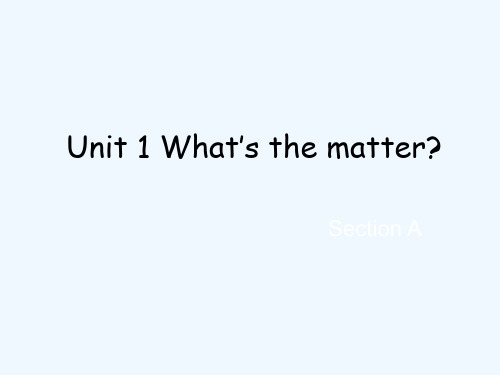
A: What’s the matter? B: I’m not feeling well.
I have a fever. A: When did it start? B: About two days ago. A: Oh, that’s too bad.
Unit 1 What’s the matter?
Section A
body
Name each part of the body
arm
ear
eye foot
leg hand
mouth
nose
tooth
neck
Follow me:
• Everybody moves your body • Nod your head and touch your face • Touch your nose and close your eyes • Touch your ears and clap your hands • Raise your arms and look at your back • Touch your stomach and tap your foot • Sit down and move your legs
What should she do? She should take some medicine.
What’s the matter with you? I have a toothache. You should see a dentist. That’s a good idea.
What’s the matter with her? She has a sore throat. What should she do?
人教版英语八年级下册第一单元Unit 1知识点
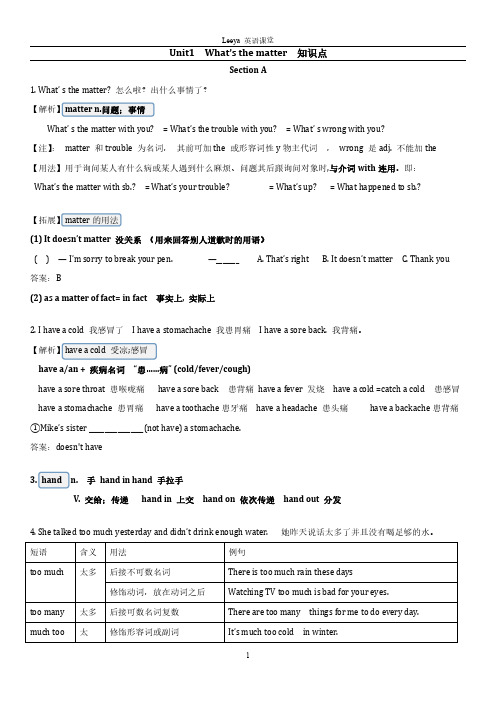
Unit1What’s the matter知识点Section A1.What’s the matter?怎么啦?出什么事情了?【解析】matter n.问题;事情What’s the matter with you?=What’s the trouble with you?=What’s wrong with you?【注】:matter和trouble为名词,其前可加the或形容词性y物主代词,wrong是adj.不能加the【用法】用于询问某人有什么病或某人遇到什么麻烦、问题其后跟询问对象时,与介词with连用。
即:What’s the matter with sb.?=What’s your trouble?=What’s up?=What happened to sb.?【拓展】matter的用法(1)It doesn’t matter没关系(用来回答别人道歉时的用语)()—I’m sorry to break your pen.—_______ A.That’s right B.It doesn’t matter C.Thank you 答案:B(2)as a matter of fact=in fact事实上,实际上2.I have a cold我感冒了I have a stomachache我患胃痛I have a sore back.我背痛。
【解析】have a cold受凉;感冒have a/an+疾病名词“患……病”(cold/fever/cough)have a sore throat患喉咙痛have a sore back患背痛have a fever发烧have a cold=catch a cold患感冒have a stomachache患胃痛have a toothache患牙痛have a headache患头痛have a backache患背痛①Mike’s sister_________________(not have)a stomachache.答案:doesn't have3.hand n.手hand in hand手拉手V.交给;传递hand in上交hand on依次传递hand out分发4.She talked too much yesterday and didn’t drink enough water.她昨天说话太多了并且没有喝足够的水。
人教版英语八年级下册第一单元知识点
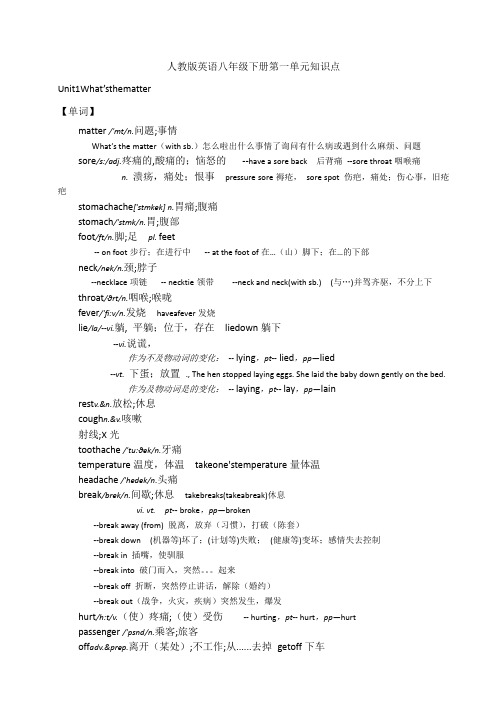
人教版英语八年级下册第一单元知识点Unit1What’sthematter【单词】matter /'mt/n.问题;事情What’s the matter(with sb.)怎么啦出什么事情了询问有什么病或遇到什么麻烦、问题sore/s:/adj.疼痛的,酸痛的;恼怒的--have a sore back 后背痛--sore throat咽喉痛n. 溃疡,痛处;恨事pressure sore褥疮,sore spot 伤疤,痛处;伤心事,旧疮疤stomachache['stmkek] n.胃痛;腹痛stomach/'stmk/n.胃;腹部foot/ft/n.脚;足pl. feet-- on foot步行;在进行中-- at the foot of在…(山)脚下;在…的下部neck/nek/n.颈;脖子--necklace项链-- necktie领带--neck and neck(with sb.) (与…)并驾齐驱,不分上下throat/θrt/n.咽喉;喉咙fever/'fi:v/n.发烧haveafever发烧lie/la/--vi.躺, 平躺;位于,存在liedown躺下--vi.说谎,作为不及物动词的变化:-- lying,pt-- lied,pp—lied--vt. 下蛋;放置., The hen stopped laying eggs. She laid the baby down gently on the bed.作为及物动词是的变化:-- laying,pt-- lay,pp—lainrest v.&n.放松;休息cough n.&v.咳嗽射线;X光toothache /'tu:θek/n.牙痛temperature温度,体温takeone'stemperature量体温headache /'hedek/n.头痛break/brek/n.间歇;休息takebreaks(takeabreak)休息vi. vt.pt--broke,pp—broken--break away (from) 脱离,放弃(习惯),打破(陈套)--break down (机器等)坏了;(计划等)失败;(健康等)变坏;感情失去控制--break in 插嘴,使驯服--break into 破门而入,突然。
人教版英语八年级下册Unit1 反身代词课件

二、反身代词的作用
2.可用作____宾_语____,强调宾语和主语是相同的人或物。
e.g. Linda bought herself a scarf. 琳达给自己买了一条围巾。 We must look after ourselves very well. 我们必须好好照顾自己。
7
二、反身代词的作用
八年级-下册-第一单元
课题:Unit 1 What’s the matter? 难点名称:反身代词 (reflexive pronoun)
1
目录
CONTENTS
导入
知识讲解
课堂练习
小节
2
导入
I can take good care of myself.
3
知识讲解
难点突破
反身代词
一、语法概念
意思是“某人自己”
她自己 herself
它自己 itself
复 我们自己 数 ourselves
你们自己 他们自己 yourselves
themselves
5
二、反身代词的作用
1.可用作____主__语___或___宾__语____ 的同位语,常用来表强调。
e.g. She herself will fly to London tomorrow. 明天她自己将要坐飞机去伦敦。 I met the writer himself last week. 我上周见到了那位作家本人。
11
四、含有反身代词的固定短语
照顾自己,别伤着 自学成才,玩得high
(all) by oneself
独自
dress oneself
自己穿衣服
enjoy oneself
玩得高兴 for oneself
人教版英语八年级下册第1单元重点知识汇总
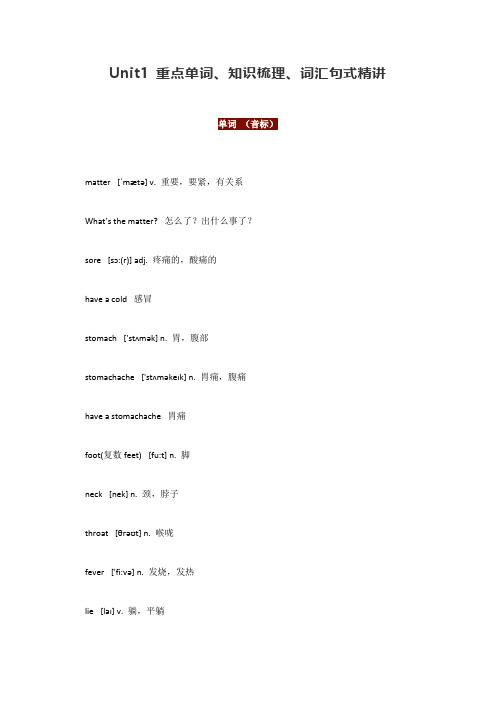
Unit1 重点单词、知识梳理、词汇句式精讲matter [ˈmætə] v. 重要,要紧,有关系What’s the matter? 怎么了?出什么事了?sore [sɔ:(r)] adj. 疼痛的,酸痛的have a cold 感冒stomach ['stʌmək] n. 胃,腹部stomachache ['stʌməkeɪk] n. 胃痛,腹痛have a stomachache 胃痛foot(复数feet) [fu:t] n. 脚neck [nek] n. 颈,脖子throat [θrəʊt] n. 喉咙fever ['fi:və] n. 发烧,发热lie [laɪ] v. 躺,平躺lie down 躺下rest [rest] n. 剩余部分,其余;放松,休息cough [kɒf] n. & v. 咳嗽X-ray ['eksreɪ] n. X光,X射线toothache [ˈtu:θeɪk] n. 牙痛take one's temperature 量体温headache [ˈhedeɪk] n. 头痛have a fever 发烧break [breɪk] n. & v. 休息,暂停;打破take breaks (take a break)休息hurt [hə:t] v. 伤害,损害,使受伤,疼passenger ['pæsɪndʒə] n. 乘客,旅客off [ɒf] adv. prep. 离开(某处);从…去掉get off 下车to one's surprise 使…惊讶,出乎…意料onto [ˈɒntə] prep. 向,朝trouble [ˈtrʌbl] n. 麻烦,烦扰,问题hit [hit] n. & v. 碰撞,打,打击right away 立即,马上get into 陷入,参与herself [hə:ˈself]她自己,她本身(she的反身代词)bandage ['bændɪdʒ] n. & v. 绷带;用绷带包扎sick [sɪk] adj. 患病的,不适的knee [ni:] n. 膝盖nosebleed [ˈnəʊzbli:d] n. 鼻出血breathe [bri:ð] v. 呼吸sunburned [ˈsʌnbɜ:nd] adj. 晒伤的ourselves [ɑ:ˈselvz]我们自己(we的反身代词)climber [ˈklaɪmə(r)] n. 登山者be used to 习惯于… 适应于…risk [rɪsk] n. & v. 风险,危险;冒险take risks (take a risk) 冒险accident [ˈæksidənt] n. 意外事件;事故situation [ˌsitjuˈeiʃən] n. 状况,形式,情况kg=kilogram [ˈkɪləgræm] n. 公斤,千克rock [rɔk] n. 岩石run out (of) 用尽,耗尽knife [naif] n. 刀,餐刀cut off 切除blood [blʌd] n. 血mean [mi:n] v. 意味着,意思是,意欲get out of 离开,从… 出来importance [ɪmˈpɔ:tns] n. 重要性decision [dɪ'sɪʒn] n. 决心,决定,抉择control [kən'trəʊl] v. 控制,支配,操纵be in control of 掌管,管理spirit ['spɪrɪt] n. 勇气,意志death [deθ] n. 死亡give up 放弃nurse [nə:s] n. 护士Judy 朱迪(女名)Nancy 南希(女名)Mandy 曼迪(女名)Aron Ralston 阿伦·罗尔斯顿Utah 尤他州(美国)Unit1 知识梳理【重点单词】matter [ˈmætə] v. 重要,要紧,有关系What’s the matter? 怎么了?出什么事了?sore [sɔ:(r)] adj. 疼痛的,酸痛的have a cold 感冒stomach ['stʌmək] n. 胃,腹部stomachache ['stʌməkeɪk] n. 胃痛,腹痛have a stomachache 胃痛foot(复数feet) [fu:t] n. 脚neck [nek] n. 颈,脖子throat [θrəʊt] n. 喉咙fever ['fi:və] n. 发烧,发热lie [laɪ] v. 躺,平躺lie down 躺下rest [rest] n. 剩余部分,其余;放松,休息cough [kɒf] n. & v. 咳嗽X-ray ['eksreɪ] n. X光,X射线toothache [ˈtu:θeɪk] n. 牙痛take one's temperature 量体温headache [ˈhedeɪk] n. 头痛have a fever 发烧break [breɪk] n. & v. 休息,暂停;打破take breaks (take a break)休息hurt [hə:t] v. 伤害,损害,使受伤passenger ['pæsɪndʒə] n. 乘客,旅客off [ɒf] adv. prep. 离开(某处);从…去掉get off 下车to one's surprise 使…惊讶,出乎…意料onto [ˈɒntə] prep. 向,朝trouble [ˈtrʌbl] n. 麻烦,烦扰,问题hit [hit] n. & v. 碰撞,打,打击right away 立即,马上get into 陷入,参与herself [hə:ˈself] pron. 她自己,她本身(she的反身代词)bandage ['bændɪdʒ] n. & v. 绷带;用绷带包扎sick [sɪk] adj. 患病的,不适的knee [ni:] n. 膝盖nosebleed [ˈnəʊzbli:d] n. 鼻出血breathe [bri:ð] v. 呼吸sunburned [ˈsʌnbɜ:nd] adj. 晒伤的ourselves [ɑ:ˈselvz] pron. 我们自己(we的反身代词)climber [ˈklaɪmə(r)] n. 登山者be used to 习惯于… 适应于…risk [rɪsk] n. & v. 风险,危险;冒险take risks (take a risk) 冒险accident [ˈæksidənt] n. 意外事件;事故situation [ˌsitjuˈeiʃən] n. 状况,形式,情况kg=kilogram [ˈkɪləgræm] n. 公斤,千克rock [rɔk] n. 岩石run out (of) 用尽,耗尽knife [naif] n. 刀,餐刀cut off 切除blood [blʌd] n. 血mean [mi:n] v. 意味着,意思是,意欲get out of 离开,从… 出来importance [ɪmˈpɔ:tns] n. 重要性decision [dɪ'sɪʒn] n. 决心,决定,抉择control [kən'trəʊl] v. 控制,支配,操纵be in control of 掌管,管理spirit ['spɪrɪt] n. 勇气,意志death [deθ] n. 死亡give up 放弃nurse [nə:s] n. 护士【重点短语】1.have a fever 发烧2.have a cough 咳嗽3.have a toothache 牙疼4.talk too much 说得太多5.drink enough water 喝足够的水6.have a cold 受凉;感冒7.have a stomachache 胃疼8.have a sore back 背疼9.have a sore throat 喉咙痛10. take risks 冒险11.hot tea with honey 加蜂蜜的热茶12.see a dentist 看牙医13.get an X-ray 拍X 光片14.take one’ s temperature 量体温15.put some medicine on sth. 在……上面敷药16. give up 放弃17. sound like 听起来像18. all weekend 整个周末19. in the same way 以同样的方式20. go to a doctor 看医生21. go along 沿着……走22. on the side of the road 在马路边23. shout for help 大声呼救24. without thinking twice 没有多想25. get off 下车26. have a heart problem 有心脏病27. to one’ s surprise 另某人惊讶的是28. thanks to 多亏了;由于29. in time 及时30. make a decision 做出决定31. get into trouble 造成麻烦32. right away 立刻;马上33. because of 由于34. get out of 离开;从……出来35. keep on doing sth. 继续或坚持做某事36. put a bandage on sth. 用绷带包扎37. fall down 摔倒38. feel sick 感到恶心39. have a nosebleed 流鼻血40. cut his knee 割伤他的膝盖41. put her head back 把她的头向后仰42. have problems breathing 呼吸困难43. mountain climbing 登山运动44. be used to doing sth. 习惯做某事45. run out (of) 用完;用尽46. so that 以便47. so...that... 如此……以至于...…48. be in control of 掌管;管理49. in a difficult situation 在闲境中【重点句型】1. What's the matter with you?= What'the trouble with you?= What's wrong with you? 你怎么了?2. What should she do? 她该怎么办呢?3.Should I take my temperature? 我应该量一下体温吗?4.You should lie down and rest. 你应该躺下休息一会儿。
人教版英语八年级下册Unit1知识点和练习(无答案)
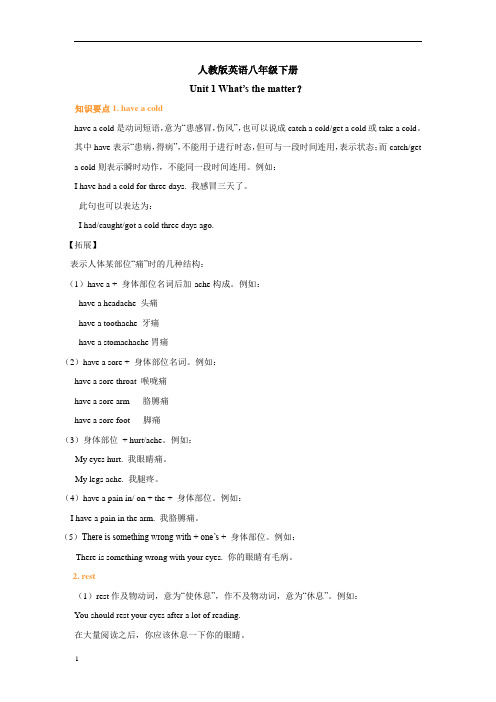
人教版英语八年级下册Unit 1 What’s the matter?知识要点1. have a coldhave a cold是动词短语,意为“患感冒,伤风”,也可以说成catch a cold/get a cold或take a cold。
其中have表示“患病,得病”,不能用于进行时态,但可与一段时间连用,表示状态;而catch/geta cold则表示瞬时动作,不能同一段时间连用。
例如:I have had a cold for three days. 我感冒三天了。
此句也可以表达为:I had/caught/got a cold three days ago.【拓展】表示人体某部位“痛”时的几种结构:(1)have a + 身体部位名词后加-ache构成。
例如:have a headache 头痛have a toothache 牙痛have a stomachache胃痛(2)have a sore + 身体部位名词。
例如:have a sore throat 喉咙痛have a sore arm 胳膊痛have a sore foot 脚痛(3)身体部位+ hurt/ache。
例如:My eyes hurt. 我眼睛痛。
My legs ache. 我腿疼。
(4)have a pain in/ on + the + 身体部位。
例如:I have a pain in the arm. 我胳膊痛。
(5)There is something wrong with + one’s + 身体部位。
例如:There is something wrong with your eyes. 你的眼睛有毛病。
2. rest(1)rest作及物动词,意为“使休息”,作不及物动词,意为“休息”。
例如:You should rest your eyes after a lot of reading.在大量阅读之后,你应该休息一下你的眼睛。
人教版八年级下册英语第一单元课件

Fun time: WhTaatswk2il:l your life be like in
10 years?
Education (school, computer, exams, learning method) Family life (food, clothes, chores, entertainment) …
1a: 语法 Learn a Sentence Structure — will + do 1. The backpack will carry you. 2. Cars will always have to stop for stop
signs. 3. The computer will punish you. 4. You will be able to drive to another
人教版八年级下册英语第 一单元课件
Period 1
Section A—1a~1c
1a:导入 Brainstorm all kinds of predictions in 2 minutes.(There are 4 people in a group.)
school life
daily life
science
future world
city…
Write down the predictions that most likely happen.
• There will / won’t be … • People will / won’t … • Kids …
Let’s predict our future! robot
There will be less pollution in the future.
人教版八年级下册英语第一单元

人教版八年级下册英语第一单元一、重点单词。
1. matter.- n. 问题;事情。
例如:What's the matter?(怎么了?)- v. 重要;要紧;有关系。
例如:It doesn't matter.(没关系。
)2. stomachache n. 胃痛;腹痛。
例如:He has a stomachache.(他胃痛。
)3. foot n. 脚;足(复数形式为feet)。
例如:My feet hurt.(我的脚疼。
)4. neck n. 颈;脖子。
例如:She has a pain in her neck.(她脖子疼。
)5. fever n. 发烧。
例如:He has a high fever.(他发高烧。
)6. lie.- v. (lay, lain)躺;平躺。
例如:You should lie down and rest.(你应该躺下休息。
)- v. 说谎(lied, lied)。
例如:Don't lie to me.(别对我撒谎。
)7. rest.- v. & n. 放松;休息。
例如:Let's have a rest.(让我们休息一下。
)8. cough.- v. 咳嗽。
例如:He coughs a lot.(他咳嗽得很厉害。
)- n. 咳嗽。
例如:She has a bad cough.(她咳嗽得很厉害。
)9. X - ray n. X射线;X光。
例如:The doctor took an X - ray of his leg.(医生给他的腿拍了X光片。
)10. toothache n. 牙痛。
例如:I have a terrible toothache.(我牙痛得厉害。
)二、重点短语。
1. have a cold 感冒。
例如:I have a cold. I feel terrible.(我感冒了。
我感觉很糟糕。
)2. have a stomachache 胃痛。
八年级下册英语人教版第一单元

第一单元主题:学校生活第一部分:单词及词组1. school life 学校生活2. literature 文学3. get along 相处4. have fun 玩得开心5. study hard 用功第二部分:课文内容本单元课文主要围绕学校生活展开,内容包括学生们对学校生活的描述和感受,以及他们对于学习和课外活动的看法。
课文通过描述学生们的日常生活和学习情况,展现了他们对学校生活的态度,以及他们对自己未来的期望和规划。
第三部分:语法要点1. 过去进行时学生们在描述自己在学校的生活时,会用到过去进行时来表达过去某一时刻正在进行的动作或状态。
例如:We were having fun at the school f本人r last Friday.2. 副词的用法在描述学校生活时,学生们会用到一些副词来修饰动词或形容词,从而更准确地表达意思。
例如:She always studies hard to get good grades.3. 介词的用法描述学校生活的学生们也会用到一些介词来表达位置、时间等概念。
例如:We often play basketball after school.第四部分:课外拓展1. 学校生活的比较可以让学生们用英语描述自己学校和其他学校的不同之处,从而拓展他们的思维,提高他们的观察力和表达能力。
2. 学校生活的变迁可以让学生们谈论自己对学校生活的期望和未来规划,引导他们思考学校生活的发展方向以及自己的学习目标。
第五部分:课堂活动建议1. 角色扮演老师可以设计一些情景,让学生们扮演不同的角色,用英语描述自己在学校的生活和情感。
2. 课外作业布置一些与学校生活相关的任务,让学生们通过语言实践,巩固所学的知识。
第六部分:学习方法建议1. 多听多说学生们可以通过听英文歌曲、看英文影视剧等方式,提高自己的英语听力和口语表达能力。
2. 多读多写学生们可以多阅读一些与学校生活相关的文章或故事,培养自己的阅读理解能力和写作技巧。
- 1、下载文档前请自行甄别文档内容的完整性,平台不提供额外的编辑、内容补充、找答案等附加服务。
- 2、"仅部分预览"的文档,不可在线预览部分如存在完整性等问题,可反馈申请退款(可完整预览的文档不适用该条件!)。
- 3、如文档侵犯您的权益,请联系客服反馈,我们会尽快为您处理(人工客服工作时间:9:00-18:30)。
Homework
An apple a day keeps the doctor away.
(一天一个苹果医生远离我)
2a-2d部分词汇及句型讲解
移动我的脖子 整个周末
sound 听起来,可做系动词 sound like 听起来像 sound +adj.
The song sounds beautifull. 这首歌听起来优美。 It sounds so nice,What beautifull music it is! I think you should sound like a normal person.
(三 )句型
1. What’s the matter with ...? / What’s wrong with ...? ……怎么了?
2. Do / Does ... have a toothache? ……牙疼吗?
3. What should ... do? ……该怎么办?
4. Should I ...? 我应该……吗?
Health is better than wealth.
(健康胜于财富)
Health is happiness.
(健康便是幸福)
was lying. 说谎
4. The doctor says that Mary must lie down
and rest an hour every afternoon. 躺下
matter temperature
in
If
breaks
Revision
(一)单词
1. ___s_o_r_e_______ adj. 疼痛的;酸痛的 2. __st_o_m__a_ch__a_ch__e_ n. 胃痛;腹痛
What’s the matter with him?
He has a stomachache.
What should he do?
He should lie down and have a rest. He shouldn’t eat anything for 2 hours.
What’s wrong with her?
She has a toothache.
What should she do?
She should see a dentist and get an X-ray.
What’s the matter with him?
He has a sore throat.
What should he do?
He should drink some hot tea with honey. He shouldn’t speak too much.
词),也有放置的意思。
巧记忆 Lie Lie Lay
过去 原形 中文意思 词性 式
lie 躺;位于 vi. lay
lie 说谎
vi. lied
放置;产 lay (卵) vt. laid
过去 现在 分词 分词 lain lying lied lying
laid laying
原文再现
A:What’s the matter? B: I have a stomachache. A: That’s too bad.You should lie down
13. _g_e_t _a_n_X__-r_a_y_______ 拍X光片
14. _se_e__a_d_e_n_t_i_st_______ 看牙医 15. _b_y_a_c_c_id_e_n_t_________ 偶然地
16. _a_ll_w__e_ek__en__d______ 整个周末
17. _si_t _in_t_h_e_s_am__e_w_a_y_f_o_r_to_o_l_o_n_g_w_it_h_o_u_t _m_o_v_in_g__
B
A
根据语境推断划线部分单词的不同含义。
1. Freezing weather in spring affected the
hens’ ability to lay. 下蛋
位于
2. The village lies in a small wooded valley.
3. You could see from his face that he
B A B B C A A
C s
巧记忆 Lie Lie Lay
Lie 说谎—耍赖—赖,与发音相近 一赖赖到底(d)lie—lied—lied(原型,过去式,过去分词) Lie躺,一躺全走样 lie—lay--lain(原型,过去式,过去分
词),也有位于的意思 这两个词的现在分词都为lying 躺过(过去式)就下蛋(产卵),下蛋是累的(laid谐音) Lay—laid—laid--laying (原型,’s the matter with them?
What’s the matter with him? He has a cold.
What should he do? He should take some medicine.
What’s wrong with her? She has a fever. What should she do? She should take her temperature.
have a rest = take a rest = rest 休息
巧记忆 Lie Lie Lay
1.There was a child _l_y_in_g_on the ground. 2.The hen __l_ai_d__an egg yesterday. 3.I need to __l_ie___ down for a while. 4._L_a_y___the books down and you can go . 5.He is __l_yi_n_g__.Don’t believe what he says.
Unit1 What’s the matter?
1a—2d
3月2日作业辅导
wrong with you
the
matter with you
too much
didn’t
has
sore
throat
dentist
cut\hurt myself
to
put
get\take an
典型错误 1 What’s happened to you? 2 She talked too much and don’t\doesn’t drink enough water. 3 a x-ray
10.ta_k_e__a_b_r_e_a_k_/_b_r_e_a_k_s_a_w_a_y__fr_o_m__t_h_e_c_o_m__p_u_ter
远离电脑休息一下
11. _h_a_v_e__a_s_t_o_m_a_c_h_a_c_h_e__/ _to_o_t_h_a_c_h_e__/ _so_r_e__ _t_h_r_o_a_t_____ 胃痛 / 牙疼 / 嗓子疼
以同样的方式坐的时间太久而不移动 18. _li_e_d_o_w__n_a_n_d__r_e_st__ 躺下并休息 19. _g_o_t_o_s_e_e_a__d_o_c_to_r__ 去看医生 20. _g_et__m_y_s_e_l_f _o_u_t_o_f_b_e_d将自己从床上拽起来 21. _h_u_r_t_m__y_se_l_f_____ 伤害我自己 22. _sl_e_e_p_w__e_ll_______ 睡得好
→ _t_o_o_t_h_a_c_h_e___ n. 牙痛 → __h_e_a_d_a_c_h_e___ n. 头痛 3. ___f_oo_t_________ n. 脚;足 → __f_e_e_t_______ 复数 4. __fe_v_e_r_____ n. 发烧
5. __li_e_____ v. 躺;平躺 → _l_a_y_______ 过去式 → __la_i_n______ 过去分词 → __ly_i_n_g_____ 现在分词
and rest.And don’t eat anything for two hours. B:I guess I should.
take breaks 休息 take a break have breaks \a break
We are having a break under the tree. 我们正在树下休息。
6. ___r_e_s_t______ v. & n. 放松;休息 7. ___co_u__g_h_____ v. & n. 咳嗽 8. __h__u_r_t _____ v. (使)疼痛;受伤
→ __h_u_r_t____ 过去式/过去分词
(二)短语
1.ta_l_k__to_o__m_u__ch_______ 说的太多
我认为你应该听起来像是个正常的人。 It looks like you need to have a rest.
away from 远离
As long as you can keep away from him, you’re safe. 只要你离他远一点,你就安全.
in the same way 以相同的方式
2.d_r_in_k__e_n_o_u_g_h_w_a_t_e_r___ 喝足够的水
3.h_a_v_e_a_v_e_r_y_s_o_r_e_t_h_r_o_at 嗓子非常疼痛 4.d_r_in_k__s_om__e_h_o_t_t_e_a_w__it_h_h_o_n_e_y 喝加蜂蜜的茶 5.ta_k_e__o_n_e_’s_t_e_m_p_e_r_a_t_u_re______ 测体温 6.p_u_t_s_o_m_e__m_e_d_i_ci_n_e_o_n__it_____ 在它上面敷药 7.h_a_v_e_a__fe_v_e_r________ 发烧 8.h_a_v_e_a_h_e_a_d_a_c_h_e________ 头疼 9.m_o_v_e__m__y_n_e_c_k_____ 移动我的脖子
